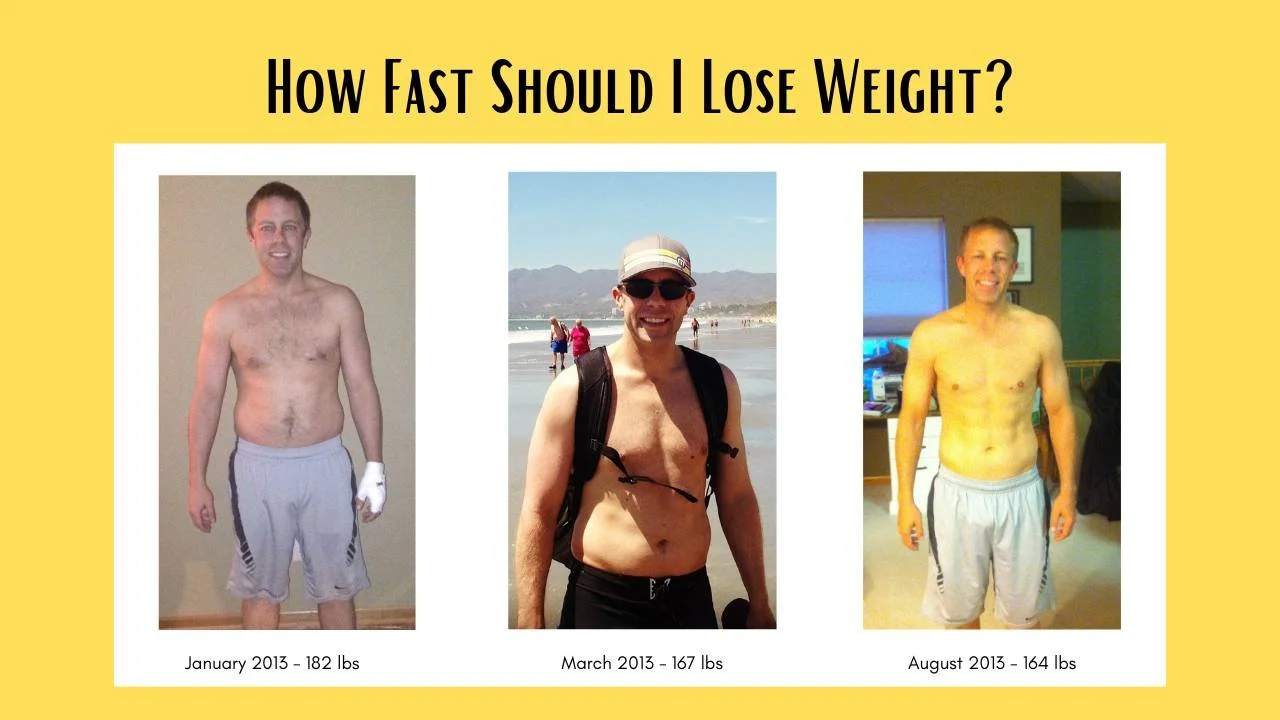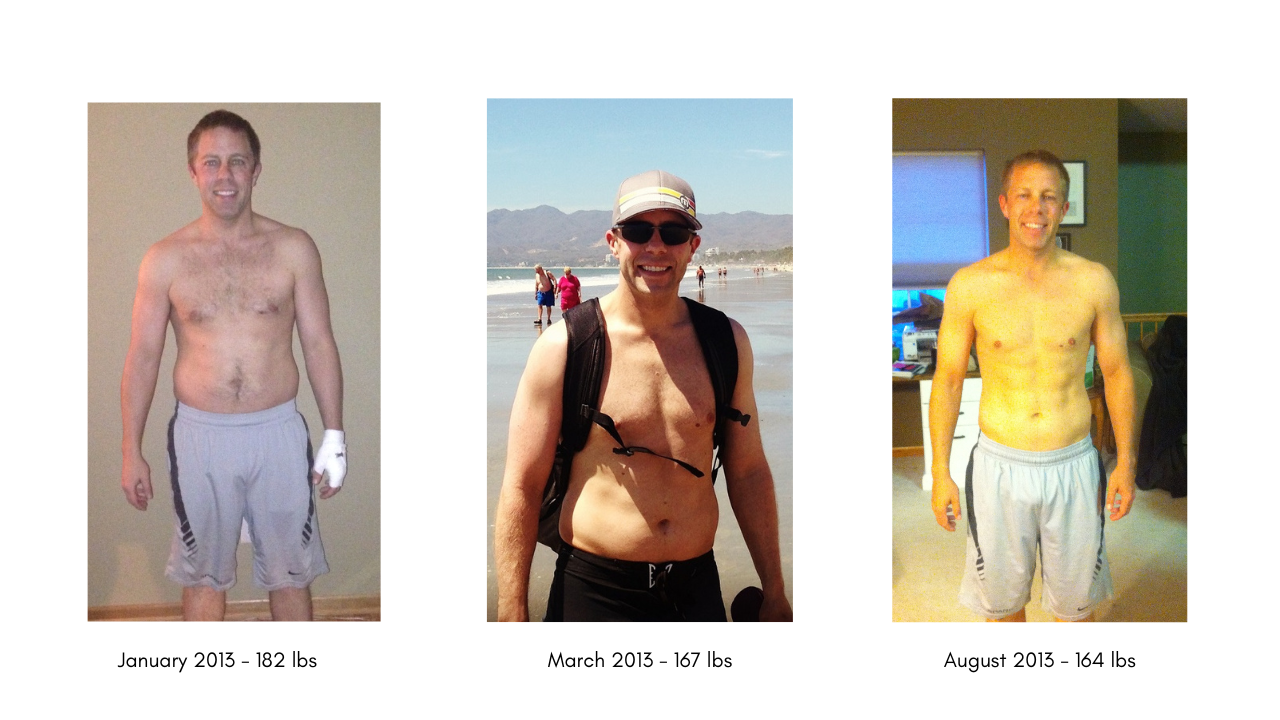How Fast Should I Lose Weight?
What is an acceptable rate to lose weight? Or I guess I should clarify that, how fast should a person lose fat?
Why the distinction between weight loss and fat loss?
I like to talk about weight loss in terms of fat loss. When you boil it down that's really what people want and usually need to lose. I've yet to work with anyone I've been coaching that told me that their muscles were just too big they wish they were smaller. This distinction ties in perfectly to the topic of this post too, so let's talk about fat loss and weight loss and some other fun stuff. Ready?
Do you have the view that when it comes to weight loss, more is better??? The faster it comes off the better. I wanted to write this post because so many people I have coached have unrealistic expectations when it comes to how fast they feel the weight(fat) should come off. I think magazine covers, the media, and our social media feeds are to blame for these unrealistic goals. Just take a look the collection of magazine covers that I found after a quick google search.
Everything happens FAST and NOW!!! The media and crappy trainers out there somehow fell in love with the idea that a pound lost per day is great marketing headline! 10 Pounds Down in 10 Days... Lose 5 Pounds in 5 Days... It's like some weird OCD thing where the numbers need match up in order to work on a magazine cover.
Throw in social media where your one friend is telling you about the cleanse they did that helped them lose 20 pounds in one month! I'm slightly guilty of that myself. I did something like that and did lose 15 pounds in 18 days. But it wasn't the best 15 pounds... take a look at my pics below.
I personally notice a bigger change between pics 2 & 3. My 15 pound weight loss was rapid but it didn't change my body composition all that much. I failed to track my body fat %'s back then but I'm guessing I was in the 20% range and maybe dropped a few points even though 15 pounds came off. What that means is I lost a lot lean mass along with some fat. Lean mass is everything from bone, water, organs, muscle, contents of your GI tract, blood, etc. Pretty sure I didn't lose any bones or organs so the lean mass I did lose likely came from water, muscle and waste. Hence the distinction that I pointed out earlier between weight loss and fat loss. Between pics 2 & 3 I only lost 3 pounds but I probably dropped from 18% body fat down to 10%.
Benefits of Losing Fat
Before I share how fast should lose fat, I want to share why focusing on fat loss is the important thing and not just overall weight loss.
You will look better! A little vanity never hurt anybody just don't go to extreme unhealthy behaviors to get those abs. Have you heard the term, "skinny fat"? That would be me in my middle pic above. I was at a healthy weight for my height, but I was still soft a little flabby, skinny fat! By losing fat and maintaining muscle mass you will have a better appearance. I hear from a lot of people that want lose fat and gain muscle. Usually, they just need to maintain the muscle and take a layer of fat off.
Your Health! Hopefully this one is a no brainer and you've read a few articles, but if not I'll share the highlights. Being overweight and carrying extra fat increases your chance of pretty much every disease under the sun, heart disease, cancer, diabetes, and hypertension to name a few. Add in adds pressure on your joints and organs and it just isn't a good thing.
There's a good chance your sleep will improve. Increased weight increases your chances of snoring and sleep apnea. Got a partner that would like to get a good night's sleep too, lose some fat!
Fat tissue is a player in your endocrine (hormonal) system. I won't get super geeky here but, basically carrying around more fat has a pretty good chance of messing up some hormones like insulin, leptin, and adiponectin. All of these hormones play in how energy is moved around the body and leptin is your "I'm full" hormone, telling you when to stop eating.
Disclaimer: Because it is part of our endocrine system and other reasons, we need some! Don't try to lose it all!
How Fast Should You Lose Fat?
Now that we know why we should lose fat, what is a reasonable rate to do it? I'll try to keep the math simple but laying out a few examples will be the best way I think to help you see what realistic fat loss looks like.
First off, I just want to make the point that progress is progress. So even if you fall onto the slow end of progress give yourself your pat on the back that you are making progress.
Second, since we are talking about losing fat, hopefully it is clear that is our goal, let me layout how we should track that rather than just the number on the scale. A few ways I recommend;
Photos; these can tell a really good story of how your body is changing. Plus, who knows maybe 5 years from now you will be writing an article like this and want to share your progress.
Girth Measurements; Get a flexible tape measure and measure a handful of areas on your body, arms, chest, waist, hips, thighs and if you want a few more you could do neck, forearms, wrists and calves.
Body Fat Caliper; These can be fairly accurate if you know what you are doing and make sure to measure in the same spots of the body. This is personally how I calculate mine. It's a super cheap way to get a fairly accurate measurement. Once you get the measurements you can go to a site like this, 7 Site Body Fat Caliper Calculator.
Scans; There are machines that a lot of gyms and healthcare facilities have that can measure your body composition. Two of the more popular ones are InBody and DEXA scans. Both can be very accurate but usually come at slightly higher cost and requires you to make an appointment with a facility.
Displacement Methods; There are methods where you can either float in a tank or be enclosed in a pod where it will measure your body density. The Bod Pod is the one that I've heard of people using but haven't used one myself. This method is going to be the the most accurate way to track your body fat.
Alright so what you've been waiting for, how fast is a good speed to lose fat? All of these rates are based on maximizing fat loss while maintaining lean mass/muscle tissue.
Slow Progress: This rate would be losing less than 0.5% of body fat in 4 weeks. An example of that would be a 180 lb female with 30% body fat which equates to 54 pounds of fat mass and 126 pounds of lean mass. So 0.5% body fat loss would leave her ending the 4 weeks somewhere between 29.6% - 29.9% body fat. This would equate to about 0.5 - 1 pound of total body weight lost.
Average Progress: This rate would be losing 0.5% body fat every 4 weeks. So at the end of 4 weeks she now has a BF% of 29.5%. Using the same female as above that would mean average progress would mean losing roughly a 1.5 pounds of body weight per 4 weeks. By the end of the year this person could expect to be in the low 20's % body fat if they stay at a rate of 0.5% every 4 weeks. Which would equate to somewhere around 20-25 pounds lost in a year.
Excellent Progress: This rate would be losing 0.5% - 1% of body fat every 2-4 weeks. Let's take the fast end of that, 1% every 2 weeks. The same female as mentioned above in the same 4 week period would would now be 28% body fat in the same 4 week period. This would equate to about 5-7 pounds of total body weight loss depending on how much lean mass was lost too, you will lose some no matter how hard you try.
Let's talk about this same female and see what a year of weight loss would like if she was doing everything right.
So if she was doing everything right I would expect that she could maintain an excellent progress rate for 4-6 months to begin her weight loss. At the end of that time period she's likely dropped 25-30 pounds and has a body fat percentage around 20%. Not to shabby for 6 months of work!
Now it is going to start taking a little more work, probably a little more tracking, a few more sacrifices and lot more patience. This is a great article about, The Cost of Getting Lean, and whether or not you want to make the sacrifices tradeoffs to get there. Once a person starts getting into that "Athletic" range of body the rate at which the fat comes off slows. This happens mainly because the calorie deficit needed to create the body fat % to drop that fast isn't sustainable once your body fat % drops.
Staying with the same female example if she were to keep going and want to make those sacrifices to lean out even more she could. Over the next 6 months if she was very diligent with her training and nutrition/diet she could likely expect to drop another 3-5% body fat and another 5-10 pounds.
What does "dieting" for a year and getting results like that look like?
Early on at the higher body fat percentages a person can expect to be eating in a calorie deficit in the range of 400-500 calories per day. The person would likely want to maintain that calorie deficit for the initial 4-6 months within maybe a short 2-3 week diet break in there where they return to maintenance level of calories for that time period.
After that initial weight loss and body fat % drop, I would recommend a person take a 4-5 week diet break, eat a maintenance level of calories. This is like hitting the reset button on with your body's metabolism. Your body doesn't like to be in a long term calorie deficit and will find ways to lower the rate at which it burns calories if you are in a long term deficit.
After that I would recommend a 200-300 calorie deficit for the next 2-3 months, diet break, then return to that same deficit.
A person throughout should be consuming a slightly higher protein diet in the range of 0.6-1.0 grams of protein per pound of body weight. This will help maintain that lean mass when you are in a calorie deficit.
You could lose significant weight and body fat without exercising but throughout this time period a mix of resistance and cardiovascular training would be highly recommended. In a study published in the Journal of American College of Nutrition two groups were put on calorie deficit diets. One group strictly did aerobic style exercise 4 times per week and one group did resistance training 3 times per week. The aerobic group lost a total of 37 pounds of which 27 pounds was from fat and 10 pounds of muscle. The resistance training group lost a total of 32 pounds but lost ZERO pounds of muscle. The aerobic group's Basal Metabolic Rate (BMR) decreased by 210 calories daily whereas the resistance training group increased their BMR by 63 calories. Even though weight loss seemed to be more effective by doing aerobic exercise strictly by total weight loss, long term weight loss will be more difficult for that group due to their lower BMR and body composition.
I'll wrap with this... weight loss is a process. I've never met a person where weight loss happens at a linear or steady rate. There will be ups and downs. Some can be explained by things you choose to eat or not eat, exercise you do or don't do, hormonal cycles, sodium intake, stress, or even sleep. The way our body absorbs energy and burns energy is a complex thing and there will be times where it just goes on autopilot and you will have very little say in your weight loss.
However, working with a coach can significantly help you figure things faster and get you back on track. A lot of coaches will strategies to bust through plateaus. They may understand why your body is holding onto weight or see patterns in your eating that are causing progress to slow. If I can help you in this area, I would love to help you out. I offer coaching services not only with macros but in other areas of nutrition that don't require you to track your daily intake. Check out the Services tab on my site for some guidance on where you should begin if you are looking for some help.




